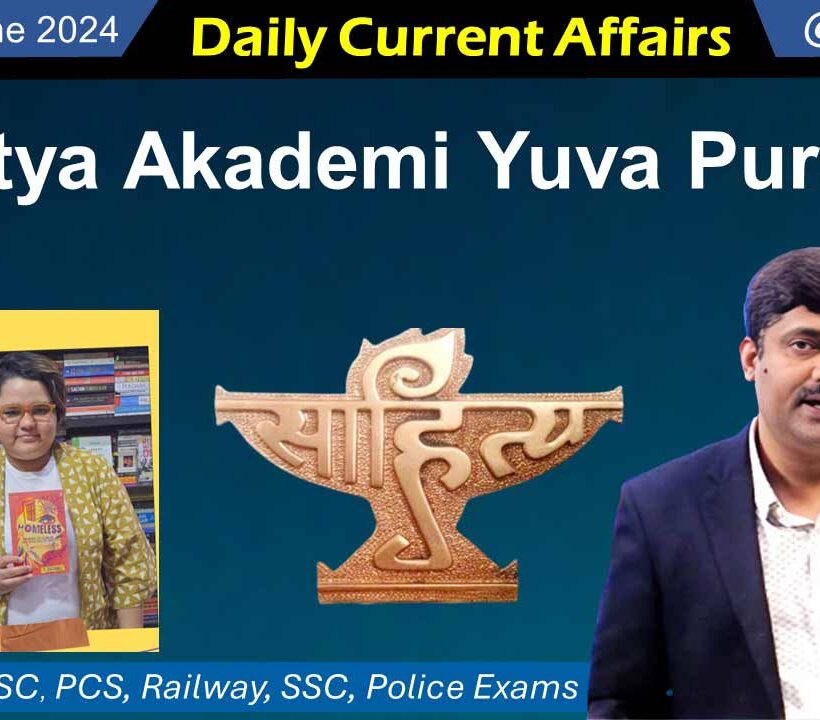This is the current affairs of 23 & 24 June 2024. Here are questions and answers of daily current affairs for better preparation of competitive exams for government jobs.
PDF Download: Click here
1. First session of the 18th Lok Sabha
– First session: June 24 to July 3, 2024
– Protem Speaker: Bhartruhari Mahtab
– On June 24, Protem Speaker Bhartruhari Mahtab first arrived at Rashtrapati Bhavan.
– President Droupadi Murmu administered the oath of office to him as Protem Speaker.
– After that, he arrived at the Lok Sabha.
– For the first two days, the Protem Speaker will administer the oath to the new MPs.
– After that, the election for the Lok Sabha Speaker will be held on June 26.
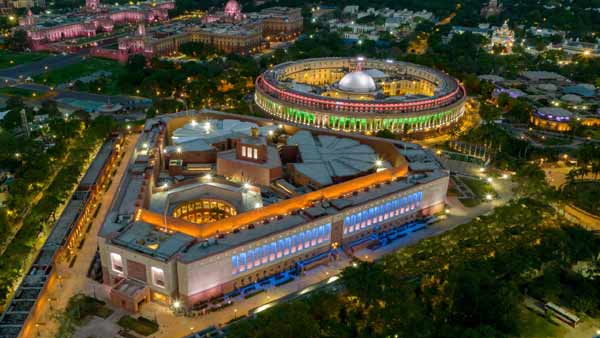
Strong opposition before Modi:
– For the first time in 10 years, PM Modi will face a strong opposition.
– The opposition might create an uproar over the NEET exam irregularities that occurred last week, the three criminal laws, and the stock market irregularities alleged after the Lok Sabha elections.
– On the last two days of the session, the government will present a vote of thanks for the President’s address, and there will be discussions in both houses.
————–
2. Who has been appointed as the new Deputy Chief of Army Staff by the Central Government?
a. Lieutenant General CP Mohanty
b. Lieutenant General NS Raja Subramani
c. Lieutenant General PK Sehgal
d. Lieutenant General Manoj Pandey
Answer: b. Lieutenant General NS Raja Subramani
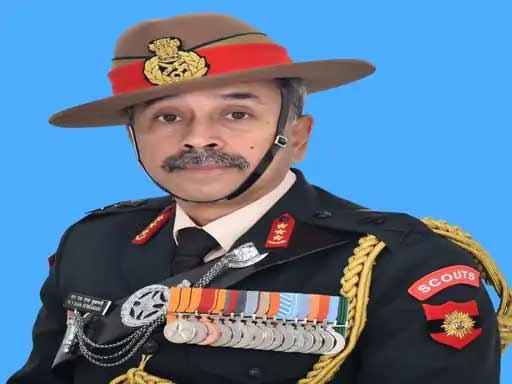
– NS Raja was previously in charge of the Army’s Central Command.
– Subramani will replace Lieutenant General Upendra Dwivedi.
– The government has appointed Upendra Dwivedi as the next Army Chief, who will replace General Manoj Pande, retiring on June 30, 2024.
NS Raja Subramani
– Lieutenant General Subramani was commissioned into the Garhwal Rifles in 1985.
– His military career has been illustrious for over 37 years.
– He is an alumnus of the National Defence Academy and the Indian Military Academy.
Note:
– The President of India is the head of the Indian Army.
– According to the Constitution, they are the supreme commander of the Indian Armed Forces.
CDS – General Anil Chauhan

—————
3. Which Muslim-majority Central Asian country passed a law banning the use of hijab?
a. Tajikistan
b. Kyrgyzstan
c. Uzbekistan
d. Turkmenistan
Answer: a. Tajikistan
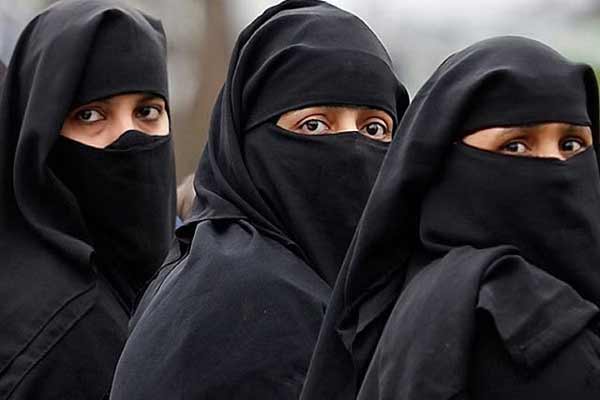
– The Muslim-majority country of Tajikistan has banned the use of hijab.
– The Central Asian country of Tajikistan, bordering Afghanistan, implemented this ban by approving a bill in the upper house of the country’s parliament on June 19, 2024.
– Along with banning the use of hijab, the country has also prohibited giving Eidi to children during the Eid festival.
Tajikistan
– Capital: Dushanbe
– President: Emomali Rahmon
– Prime Minister: Kokhir Rasulzoda
– Currency: Somoni
– Language: Tajik
– Population: 9.95 million (2022)
– Neighboring countries: Afghanistan, China, Kyrgyzstan, and Uzbekistan
Why the Ban was Imposed
– According to Bishkek’s news agency, President Emomali Rahmon announced the ban on hijab, calling it a “foreign garment.”
– The new law stipulates fines ranging from 60,000 to 500,000 rupees (in Indian currency) for non-compliance.
– Religious or government officials who do not adhere to this law will face fines ranging from 300,000 to 500,000 rupees.
According to Tajikistan’s news agency Asia-Plus, the government took this step to promote secularism in the country.
– Suleiman Davlatzoda, the head of the country’s religious committee, stated that the decision to ban Eidi was made to curb unnecessary expenses and to increase focus on children’s safety and education.
Movement in 2015
– In 2015, President Emomali Rahmon led a campaign against the hijab in Tajikistan, stating that it was a sign of poor education and incivility.
Ban on Islamic Clothing 17 Years Ago
– The strictness on hijab began in 2007 when the Tajik Ministry of Education banned both Islamic clothing and Western-style mini skirts for students.
– This ban was later extended to all public institutions.
– Following this, the government started promoting traditional Tajik attire, spreading messages to households via phone calls.
These Four Countries Have Also Imposed a Ban
– Besides Tajikistan, the Muslim-majority countries of Kazakhstan, Azerbaijan, Kyrgyzstan, and Kosovo have also banned the wearing of hijabs and burqas in schools, universities, and government offices.
—————
4. Which writer was given the Sahitya Akademi Yuva Puraskar 2024 for Hindi language?
a. Gaurav Pandey
b. Devidas Saudagar
c. Megh Singh
d. Mohammad Ashraf Zia
Answer: a. Gaurav Pandey

Gaurav Pandey
– Gaurav Pandey has been selected for the Sahitya Akademi Yuva Puraskar for his Hindi poetry collection “Smritiyon Ke Beech Ghiri Hai Prithvi.”
– This is Gaurav Pandey’s second poetry collection published by the Sahitya Akademi.
– His first poetry collection, “Dharti Ek Chidiya Hai” (2021), was also published by the Sahitya Akademi.
– Gaurav Pandey, a resident of Kaushambi in Uttar Pradesh, has written several poetry collections.
Sahitya Akademi Yuva Puraskar
– The Sahitya Akademi announced the Yuva Puraskar 2024 for different languages in June 2024.
– The announcement of the winner of the Yuva Puraskar in Sanskrit will be made later.
– The Yuva Puraskar has been awarded for 10 poetry books, seven short story collections, two essays and one essay collection, one novel, one ghazal book, and one memoir.
– The winners of the Yuva Puraskar will be awarded a commendation certificate with an embossed copper plaque and a check of Rs. 50,000.
Chairperson – Madhav Kaushik
—————
5. Which writer has been selected for the Sahitya Akademi Yuva Puraskar 2024 for English language?
a. Heena Chaudhary
b. K. Vaishali
c. Anjan Karmakar
d. Shruti B R
Answer: b. K. Vaishali
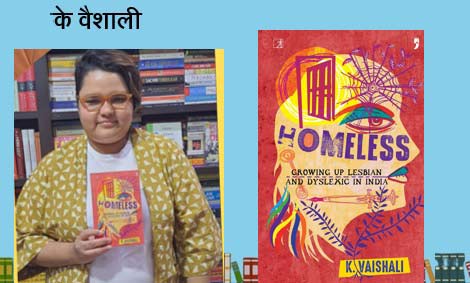
– Ke Vaishali has been awarded for her memoir “Homeless: Growing Up Lesbian and Dyslexic in India.”
– In this memoir, she talks about her journey of struggling with dyslexia and exploring her sexuality at the age of 20.
– After leaving her home in Mumbai, Vaishali settled in Hyderabad, where she wrote about topics such as mental health, caste, homophobia, and academic failure.
– She works as a representative for learning disabilities at the International Purple Fest and leads the LGBTQ+ Business Resource Group for Japan and the Asia-Pacific region in her tech company.
—————
6. Sahitya Akademi Yuva Puraskar 2024 Winners List
Language, winner and work
1. Hindi- Gaurav Pandey: “The Earth is surrounded by memories” (Poetry collection)
2. English- K. Vaishali: ‘Homeless: Growing Up Lesbian and Dyslexic in India’ (Book)
3. Assamese- Nayanjyoti Sharma: Jal Kota Jui (Story collection)
4. Bengali- Sutapa Chakraborty: Deraje Halud Ful, Gatajnama (Poetry collection)
5. Gujarati- Rinku Rathod ‘Sharvari’: To Tame Raaji (Poetry collection)
6. Marathi- Devidas Saudagar: Usavan (Novel).
7.Nepali- Suraj Chapagain: Kyanabhasko Kshitij (Poetry Collection)
8.Odia- Sanjay Panda: Hu Baia (Story Collection)
9.Kannada- Shruti BR: Zero Balance (Poetry Collection)
10.Malayalam- Shyamakrishnan R: Meeshakkallan (Story Collection)
11.Tamil- Lokesh Raghuraman: Vishnu Vandhar (Story Collection)
12.Telugu- Ramesh Karthik Nayak: Dhavalo (Story Collection)
13.Bodo- Self Made Rani Bar’ Saikhllum (Story Collection)
14.Dogri- Heena Choudhary: Ek Rang Tere Rangen Cha (Poetry Collection)
15.Kashmiri- Mo Ashraf Zia: Ain Badas (Criticism and Research Article)
16.Konkani- Adwait Chandrakant Salgaonkar: Pednyacha Samaraan (Essay Collection)
17.Maithili- Rinki Jha Rishika: River Valley Civilization (Poetry Collection).
18.Manipuri- Waikhom Chingkheinganba: Ashiba Toorel (Poetry Collection)
19.Rajasthani- Sonali Suthar: Sudh Sodhun Jag Angnai (Poetry Collection)
20.Santhali- Anjan Karmakar: Jangbaha (Poetry Collection)
21.Sindhi- Geeta Pradeep Rupani: Paper Parya (Article Collection)
22.Punjabi- Kuldeep Singh: ‘Main Jallianwala Bagh Bolda Haan’ (Drama)
23.Urdu- Shamsul Islam Farooqi: ‘Barf Ka Desh Antarctica’ (Story)
—-
Sahitya Akademi Award
– The Sahitya Akademi Award is a literary honour in India, given annually by the Sahitya Akademi, India’s National Academy of Letters, to authors of the most outstanding books of literary merit published in any of the 22 languages in the 8th Schedule of the Indian Constitution and in English and Rajasthani languages.
– The award consists of a plaque and a cash prize of ₹1,00,000.
—————
7. Who has been selected by Sahitya Akademi for ‘Bal Sahitya Puraskar 2024’ for Hindi language?
a. Kshetrimayum Subadani
b. Gira Pinakin Bhatt
c. Devendra Kumar
d. Bishan Singh ‘Dardi’
Answer: c. Devendra Kumar

– Devendra Kumar’s collection of children’s stories ‘Ikyaawan Bal Kahaniyaan’ received this award for Hindi language.
– Devendra Kumar was associated with the children’s magazine ‘Nandan’ since 1971.
– His writing continued even after his retirement from ‘Nandan’.
– However, this magazine has now been closed.

—————
8. Who has been selected by Sahitya Akademi for ‘Bal Sahitya Puraskar 2024’ for English language?
a. Ranju Hazarika
b. Sudha Murthy
c. Dipanwita Roy
d. Nandini Sengupta
Answer: d. Nandini Sengupta
– Nandini Sen Gupta received this award for her novel “The Blue Horse and Other Amazing Animal Stories from Indian History”.
– Nandini Sen Gupta is a historical fiction writer based in Pondicherry.
– After a trip to the caves of Ajanta and the Kailash Temple in Ellora in 2007, she was influenced by India’s past.
– “The Blue Horse and Other Amazing Animals from Indian History” has been published by Harper Collins India.
—————
9. List of winners of Children’s Literature Award
Idioma, ganador y trabajo.
1.Inglés-Nandini Sengupta: “El caballo azul y otras asombrosas historias de animales de la historia de la India” (novela)
2. Hindi- Devendra Kumar: ‘Ikyavan Bal Kahaniyan’ (colección de historias)
3. Sánscrito- Harshadeva Madhav, Bubhukshit: Kaak: (colección de historias).
4.Asamés- Ranju Hazarika: Biponna Bismoi Khel (Novela).
5. Bengala- Deepanvita Roy: Mahidadur Antídoto (Novela).
6. Gujarati- Gira Pinakin Bhatt: Hasti Haveli (colección de cuentos).
7. Marathi- Bharat Sasane: Samsher y Bhootbangla (novela).
8. Nepalí-Vasant Thapa: Desh Ra Phuchhe (colección de poesía).
9. Oriya- Manas Ranjan Samal, Gap Kalika (colección de historias).
10.Kannada- Krishnamurthy Billigere: Chumantrayana Kathegalu (colección de cuentos).
11.Tamil- Yuma Vasuki: Thanaviyin Piranthanal (colección de historias).
12.Telugu- P Chandrashekhar Azad: Maya Lokam (Novela).
13.Malayalam- Unni Ammayambalam: Algorithangalude Naadu (Novela)
14.Bodo-Bharjin Jek’Bha Mosahari: Buhuma Byanibo (Colección de poesía).
15. Dogri-Bishan Singh ‘Dardi’: Kukkadu-Kadu (colección de poesía).
16.Kashmiri- Muzaffar Hussain Dilbar: Son Gobreyo (colección de poesía).
17.Konkani- Harsha Sadhguru Sheta: Ek Ashilen Baiul (Novela).
18.Maithili-Narayanji: Granada (colección de cuentos).
19.Manipuri-Kshetrimayum Subdani: Malem Atiya (Novela).
20.Rajasthani- Prahlad Singh ‘Jhorda’: Mhari Dhani (colección de poesía).
21. Santhali-Dugai Tudu: Miru Arang (Colección de poesía)
22.Sindhi- Lal Hotchandani ‘Laachar’: Dostan Ji Dosti (colección de historias)
—————
10. When is International Widows’ Day celebrated?
a. 21 June
b. 22 June
c. 23 June
d. 24 June
Answer: c. 23 June
– The United Nations General Assembly designated this day in 2011.
Why International Widows Day?
– International Widows Day is observed to raise awareness and improve the situation of widows, providing them with opportunities.
– Widows, especially in developing countries, often experience discrimination, social exclusion, and economic hardship after the death of their husbands.
– They may face barriers to inheriting property, accessing education and healthcare services, and participating in the workforce, leading many widows and their children to become trapped in cycles of poverty and marginalization.
PDF Download: Click here

